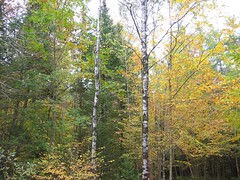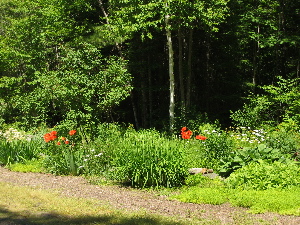SNOW IN THE MOUNTAINS
Yesterday we went to Littleton, NH so my husband could go to the camera shop. I on the other hand, went to the Book Store. After we finished satisfying our needs at each of those places, we decided we'd go to the movies. In order to get to Lincoln, where the movies were, we drove through Franconia Notch. It's a beautiful drive. Among other things it goes right by the "Old Man of the Mountain". Unfortunately, as you probably know, the Old Man fell off the mountain and the spot where his face used to be is now just a bare face of stone on the side of a precipitous cliff. How sad!
However, what was really interesting was that the snow plows had actually visited during the night. We had had a few inches of snow. Also, Cannon Mountain Ski area had snow on all the trails and it looked like January!
What does that have to do with Gardening? Nothing I guess, except that it pretty much marks the end of our "outside" time! There are still a few things that can be tended to, but it is just "tending" time, not "doing" time. Realize that your garden isn't gone, it's just resting, catching it's breath, taking a break before beginning up again in the spring.
What you can do is go around and just tidy up. Put debris into the compost heap. Remove all those hoops and poles that supported plants that are now decimated by the frost. Be sure that all your tools are inside AND clean! If the hose hasn't been removed and drained, do that too. It's important to drain it because if you don't, it will freeze and split. Clean off your lawn mower and other garden appliances. If they need some work, get them to the shop now. It's a quiet time for those folks right now. It's after gardening time, and before snowmobile time. Time to sharpen, oil, repair and just clean up tools of all kinds.
As far as this site is concerned, I'll continue to add to it, but a bit less regularly. I too will take time to do some "catching up". Read, write, take some courses and maybe give one. At any rate, keep visiting. Don't let's lose touch. If you think of any questions you'd always wondered about, shoot them in my direction and I'll try to help.





